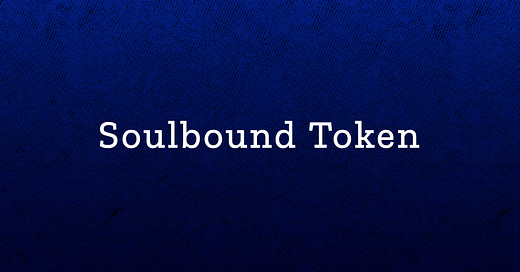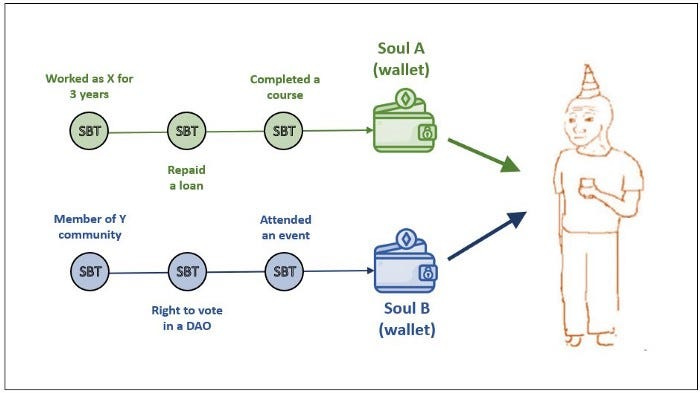SoulBound Token (SBT)? Another version of NFT?
Soulbound token (SBT) is a non-transferable token (NTT) representing a person’s identity using blockchain technology.
In May 2022, the concept of a decentralized society (DeSoc) and SoulBound Token (SBT) was proposed by Ethereum cofounder Vitalik Buterin, lawyer Puja Ohlhaver, and E. Glen Weyl, an economist and social technologist. After that, there are so many articles, discussions,…concerning it among the crypto community.
Actually, at the beginning days of NFT, I saw CryptoPunks and I used to think that it had been a jpeg or png picture. It doesn’t mean anything, it’s just a thing with no real value. I suppose that some of us were once thought, too.
At the moment, we know that NFT has brought true value to Cryptocurrency and the real world onward, especially to art. Because of that, there are so many versions of NFT to optimize its usage such as Fractionalized NFT, Semi-Fungible Tokens…and one of the versions I would like to share with you, it is Soulbound Token or Non-transferable tokens (NTT). It is another version of NFT, isn’t it?
Now, let’s dive into it. I’m Neo — Admin — Community Manager of Optimus Finance and Growth Marketing of LECLE Vietnam.
1. What is SoulBound Token (SBT)?
Soulbound token (SBT) is NFT 2.0, NFT v2 or the next level of NFT,…whatever you call it.
Soulbound token (SBT) is non-transferable token (NTT) representing a person’s identity using blockchain technology. This could include medical records, work history, and any type of information that makes up a person or entity, tied to one wallet as its “Soul”.
In an easy way, NFT is unique but transferable, while SBT is still NFT, but non-transferable.
The logic behind Soulbound originates from the popular online game World of Warcraft.
Players cannot sell or transfer Soulbound items. Once picked up, Soulbound items are forever “bound” to the player’s “soul.”

3 following authors of the concept of SBT:
Glen Weyl, the founder of Radicalxchange and a researcher at Microsoft, is the co-author of Decentralized Society: Finding Web3’s Soul.
Puja Ohlhaver is the second author of the DeSoc concept. She is currently a builder at Flashbots.
Vitalik Buterin, the founder of Ethereum, depicted the blockchain space with SBTs where participants have crypto wallets as Souls that can store SBTs corresponding to credentials, memberships,… Simply put, SBTs are similar to a Web3 CV for the holders.
2. SoulBound Token use cases
SBT has plenty of potential use cases:
2.1. Identity
Of course, thanks to tied its “Soul”. We can identify someone easily. Each Soul (a crypto wallet) stores the holder’s data, such as credentials, certificates, memberships,…, in the form of SoulBound Tokens.
Digital identity is a big step that allows governments or states to manage in seconds.
2.2. NFT
After a period of time, NFTs have developed into an indispensable part of the crypto world. Many NFT collections are worth millions of dollars, such as Bored Ape Yacht Club and CryptoPunks.
However, there are many limitations, especially rights that still interfere with NFT artists or even users. According to Vitalik Buterin, SBT will be the solution since it is non-transferable, empowering the artists’ ownership.
2.3. Souldrops
Souldops are airdrops or something like certifications distributed to specific guys who own SBT representing their eligibilities.
Example: When people graduate from university, they receive a certificate proving completion of the required courses. The university could be a Soul issuing the SBTs, and the students would be Souls when receiving Souldrops.
SBT would store the student’s credentials, proving they hold the relevant qualifications and are a member of the university. Simply put, the SBT would function as proof of attendance.
2.4. DAO
A decentralized autonomous organization (DAO) is a blockchain-based social model that develops community power. Despite decentralization, some DAOs have some big whales who own the majority of governance tokens. This will make inequity in the future growth of the protocol.
With SBTs, voting power is equally distributed. Every “Soul” wallet will be able to vote. In addition, SBTs are non-transferable, so it is almost impossible to accumulate voting power in a centralized entity.
2.5. DeFi Lending
Lending without any collateral is still a big challenge for lending protocols in crypto. The collateral ratio (collateral/loan) is often more significant than 100%, meaning over-collateralized lending.
This principle secures the benefit of lenders because liquidation is triggered when the collateral declines to a value smaller than the loan.
Banks or lenders use credit scores in traditional finance to lend someone money. Despite that, a high level of bad debts still exists in banks, increasing inefficiencies.
With SBT, lending without any collateral is facilitated. SBT represents the owner’s credentials and historical data. Lenders can be determined by looking at proof of identity given by SBT. Therefore, a borrower can take a bigger loan with his collateral.
3. How do SBTs work?
Every crypto wallet is described as a “Soul” where it can store SBTs. Soul wallets are responsible for verifying the data of SBTs before using them for storage since SBTs are non-transferable. SBTs come with the Soul forever. SBTs are public on blockchains and everyone can search them for different purposes.
Furthermore, Vitalik Buterin also proposed a wallet recovery feature that recovers lost Souls. If the consent is met, Soul recovery will be facilitated.
4. Limitations of SBT
SBT is public: SBT is proof of the owner’s character. Some crypto wallets holding SBT, will not want to get be watched because of their reputation. Someday, you will be more famous and will be sure not to want anyone to visit your Soul. Therefore, Vitalik Buterin and other co-authors of SBTs consider adding more functionalities as options, such as SBT burning or SBT hiding.
Interoperability: SoulBound Token has considered whether protocols accept its implementation. The adoption of SBTs must be wide enough, like NFTs.
5. The day SoulBound Token will be released
Viltalik Buterin and the other two co-authors incubate the SBT concept for the vision of a decentralized society (DeSoc) in 2024. Therefore, it is expected to go mainstream by 2024. At the moment, SBTs are only on paper, not available for usage. Before its launch, the concept of SBTs is amendable, and it is just the beginning of a new token concept.

According to the interview of Jason Levin and SBT’s co-author, Glen Weyl, SBTs will be available for early users by the end of 2022. He also supposed that it would be important for SBTs by 2024.
6. Closing thoughts
SBTs have become a hot topic in Web3. SBTs unlock many use cases that NFTs can not support. By the way, SoulBound Tokens still have a long road ahead to mass adoption.
What if an SBT can function as Web3’s version of the “identity card”?
This post is for educational purposes only. All materials I used were the different reference sources. Hope you like and follow us and feel free to reach out to us if there is an exchange of information. Cheers! 🍻
#soulbound #SBT #web3 #NFT








